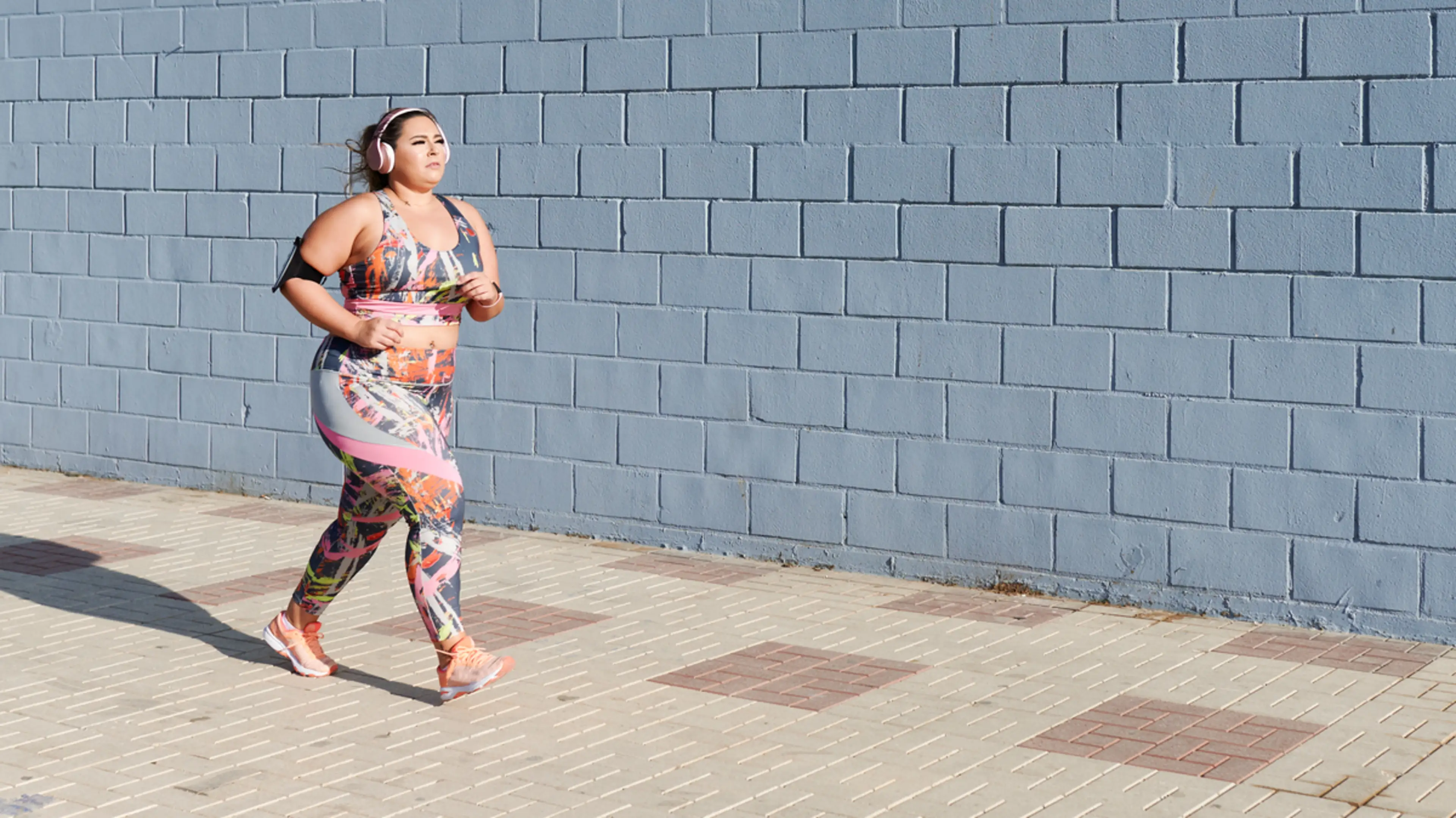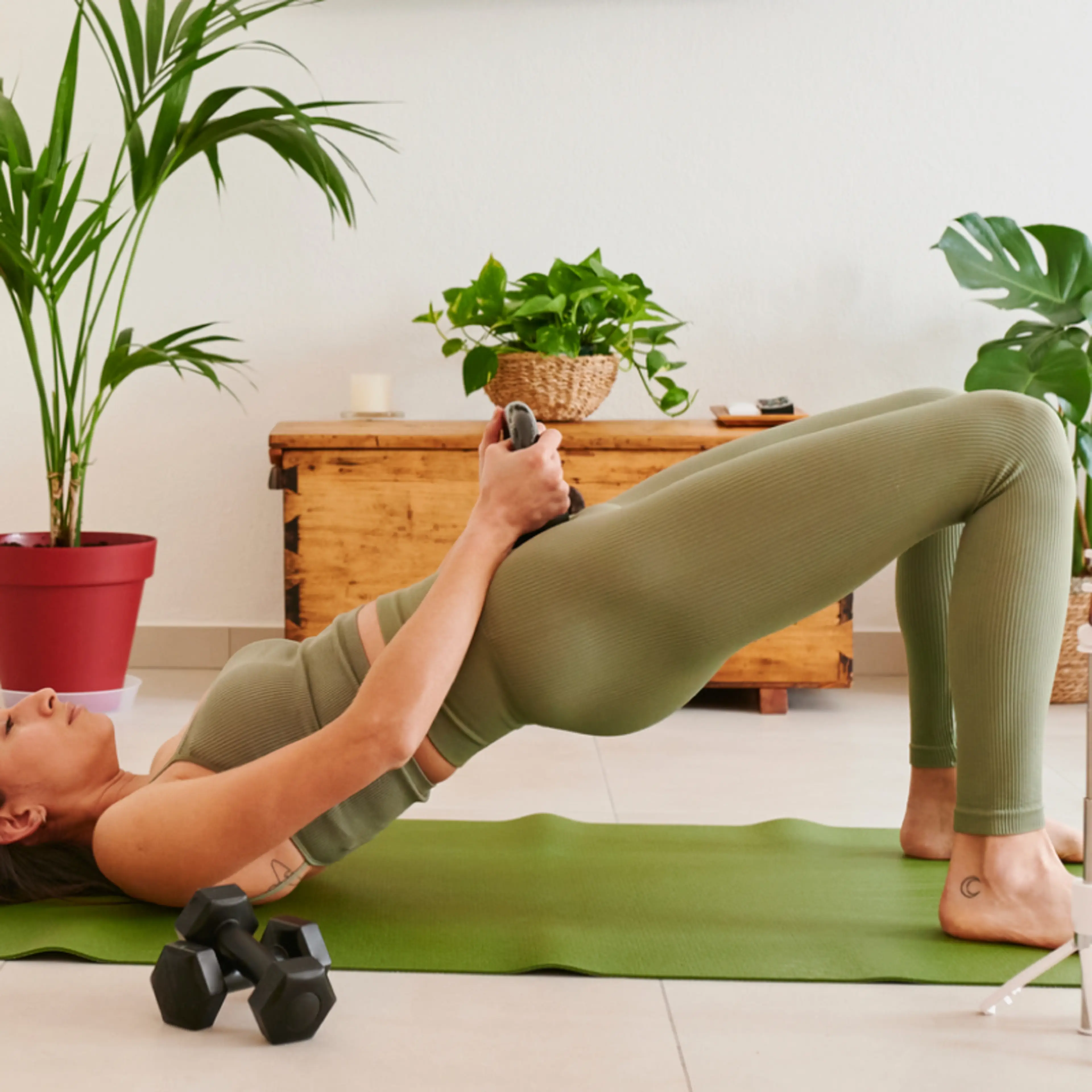During pregnancy, there’s a lot you’re told to avoid: sushi, saunas, soft cheeses, and so forth. But what about exercise? Unless you’re experiencing complications, it’s not on the list.
“We absolutely encourage and recommend exercise throughout pregnancy,” says Dr. Clara Paik, vice-chair of the Department of Obstetrics and Gynecology and chief of the Division of Gynecologic Specialties at UC Davis Health.
According to the Mayo Clinic1 , regular exercise during pregnancy can help relieve common complaints like back pain, constipation, bloating, swelling, and sleeping poorly. Research also links exercise to a lower risk of gestational diabetes2 and shortened labor time3 .
You get the idea: Pregnancy is an excellent time to be active. But what exactly does that mean? Can you keep going to your favorite cycling class? Is it really okay to work your core? And what about high-impact movements like running or jumping—could they hurt your baby? We asked doctors and physical therapists some of the most common questions about exercise during pregnancy. Read on for their expert advice.
Can I Run While Pregnant?
If running was already part of your pre-pregnancy fitness routine, yes. But if you’re not already a marathoner, don’t start training for a race now. “If you were a regular runner before pregnancy, then it’s absolutely safe4 to keep up with your usual runs, as long as it feels good,” Dr. Paik says.
However, whether running feels good or not will likely change throughout your pregnancy—and from pregnancy to pregnancy, says Kristie Alicea, a pre/postnatal fitness specialist and founder of ABC Fit Collective5 . For example, you may feel perfectly comfortable during the first trimester, but as your pregnancy progresses and your belly grows, running can put a lot of pressure on your joints and pelvic floor, the group of muscles that supports your bladder, rectum and reproductive organs, including your growing uterus.
That’s why it’s important to pay attention to what your body is telling you. “By the third trimester, you might feel like you’re running with a bowling ball in between your legs,” Alicea says. Hip or back pain, peeing when you run (despite trying to hold it in) or feelings of heaviness or pressure in your lower pelvis are signs it’s time to reduce your level of strenuousness.
Gradually reducing distance, speed, and duration can help keep you running as your pregnancy progresses. But at some point—probably as you approach the third trimester—you might stop running altogether and opt for lower-impact workouts such as walking, cycling or swimming until after you deliver. That said, every pregnancy is different, and some people are able to keep it up until they give birth.
Can I Do Core Exercises While Pregnant?
Core work is not only safe but it’s encouraged throughout pregnancy, according to Katelyn Baud, a pre/postnatal fitness specialist and founder of Mom Baud6 .
“A strong core can help minimize back pain (by promoting good posture and supporting the spine as your belly gets heavier), prepare you for labor, and help you recover faster postpartum,” says Katelyn Baud, a pre/postnatal fitness specialist and founder of Mom Baud.
The best exercises you can do target the deepest core muscles (the transverse abdominis) and your pelvic floor to build a strong and stable foundation, Baud says. That typically translates to moves that keep your back, especially your lower back, in a straight, flat position. Safe and effective options include:
Side plank lift: exhale as you lift your hips into side plank on your forearm, then lower and repeat.
Bear hold or bear plank: on all fours, exhale and “zip up” your deep core muscles as you lift your knees a few inches off the floor.
Bird-dog: on all fours, lift one leg and the opposite arm at a time.
Farmer’s carry: hold a weight in one hand and carry it as you walk, resisting the urge to bend your torso toward the weight.
The exact core exercises you do are less important than how you do them, meaning proper form, breathing and engaging the right muscles are key. That’s why Baud recommends all pregnant people practice deep core breathing, because it helps you learn how to use your core and pelvic floor muscles together.
Try this 360° Breathing7 technique: Sit in a comfortable chair with your ribs stacked over your pelvis, neck long and shoulders relaxed. Place your hands around your lower rib cage. Inhale through your nose and feel your ribcage expand in all directions (front, sides and back). As you exhale completely through your mouth, pull your belly button in toward your spine and draw up your pelvic floor muscles (imagine you’re trying to stop pee mid-stream). Repeat for several slow breaths, exhaling as long as you can to get all the air out.
Are There Certain Core Exercises I Should Avoid While Pregnant?
The short answer is yes, you might want to avoid sit-ups, crunches or leg lifts during pregnancy.
These movements can exacerbate the normal separation of your abdominal muscles that happens as your baby grows, which sometimes, but not always, leads to a condition called diastasis recti.
“The key thing we’re looking for is ‘doming’ or ‘coning’ through the middle of the core, which often happens with crunches, sit-ups and leg lifts,” says Dr. Lizzie Kieffer, a physical therapist who specializes in pelvic floor, pregnancy and postpartum health. “Using your breath properly and engaging your deep core muscles can help prevent that coning.” But if you want to err on the side of caution, choose different core exercises during pregnancy.
It’s worth noting that some everyday movements can also cause doming of your core, like sitting up in bed or getting up off the floor. In those situations, Dr. Kieffer recommends rolling to your side first or properly bracing to prevent the doming as much as possible.
What’s a Safe Heart Rate for Exercise During Pregnancy?
If you’ve been told all pregnant people should keep their heart rate below 140 beats per minute (BPM), that’s outdated advice. Instead, doctors say you should exercise as you feel comfortable—it’s not about any specific number on a heart rate monitor. This has also been the standard advice backed by8 the American College of Obstetricians and Gynecologists (ACOG) since 1994.
So why the confusion? ACOG’s original 1985 guidelines for exercising during pregnancy included a warning to never get your heart rate above 140 BPM. This was based on the “concern” that if you exercised too vigorously, you might divert blood away from the fetus, Dr. Paik explains. But modern science proves that doesn’t actually happen.
While you want to avoid overheating or working out to the point of exhaustion, getting your heart rate above 140 BPM during your favorite cycling class, for example, is considered safe. In fact, if you have a healthy pregnancy with no complications, the U.S. Department of Health and Human Services9 recommends at least 150 minutes of moderate-intensity aerobic activity per week—without any heart rate limitations.
Can I Lift Weights While Pregnant?
The advice here is similar to running: If you regularly lifted weights before pregnancy, it’s safe to continue as long as it feels good. And there are some pretty compelling reasons to do so. Research published in the Strength and Conditioning Journal10 found the benefits of doing weight-bearing exercise in pregnancy include everything from a lower risk of preeclampsia (high blood pressure during pregnancy) to a better body image and even an easier labor.
“In addition to training your body for childbirth, which is a major event, you’re also preparing for parenthood,” Alicea says. Think about it: Carrying around a baby all day, schlepping a car seat or squatting down to pick up your child all require strength.
All people and pregnancies are different (and there are some conditions that require limiting the amount of weight you lift) so it’s always smart to check with your healthcare provider about any potential risks for you. If you get the green light, Dr. Keiffer says to remember this tip during strength workouts: Exhale with exertion.
“This helps you properly brace when lifting weights,” she says. “Take a weighted squat, for example: Inhale as you lower into the squat, and as you push up, exhale, engage your pelvic floor and ‘wrap your core’ or think of ‘hugging your baby’ with your core,” she says. “This will help protect your body through the lift and keep you strong and safe.”
Is Jumping Okay During Pregnancy—Does It Shake My Baby Around?
Will doing a set of jumping jacks give your baby whiplash? No. “Babies are protected by their amniotic fluid and sac,” Dr. Paik says. So when you jump, they’re securely positioned in their little bubble inside of your body.
But there are other reasons you might want to limit high-impact exercises later in pregnancy. Similar to running, “jumping can put extra strain on the pelvic floor muscles—which are already working overtime—and potentially worsen symptoms like urinary incontinence,” Baud says. Her recommendation: When your midsection is heavier (aka second or third trimester), trade jumping for low-impact movements that can still get your heart pumping. For example:
Instead of squat jumps, try squat-to-jab or bodyweight squats
Instead of alternating lunge jumps, try to reverse lunge to front kick
Instead of burpees, simply eliminate all jumping (step back into a high plank and then step back in before standing)
What Are Warning Signs I Should Stop Exercising Right Away During Pregnancy?
If you experience any leaking of blood or fluid from your vagina or regular, painful contractions—during exercise or otherwise—call your healthcare provider right away to check in, Dr. Paik says. Other signs you should stop exercising include11 :
Feeling dizzy or faint
Shortness of breath before you start exercising
Chest pain
Headache
Calf pain or swelling
While it may be nothing to worry about (headaches and cramping are both very common throughout pregnancy), these are all potential signs of a medical issue so warrant a call to your healthcare provider.
I’m a Fit Person. Why am I Suddenly So Winded During Workouts?
Your body is growing an entirely new human, and that’s exhausting work! If something that used to feel simple now has you huffing and puffing, there are a few explanations: First, “pregnancy occupies the abdomen and pushes on your lungs a bit, which contributes to shortness of breath or feeling winded,” Dr. Paik says. You’re also carrying around more weight, meaning your heart and lungs have to work harder to do the same level of activity that might’ve felt easy just a few months ago.
This doesn’t mean your fitness level has suddenly tanked; your body simply has new demands placed on it. Movement will feel different, and that’s totally normal. The good news is that you should quickly go back to your normal breathing postpartum, Dr. Paik says.







